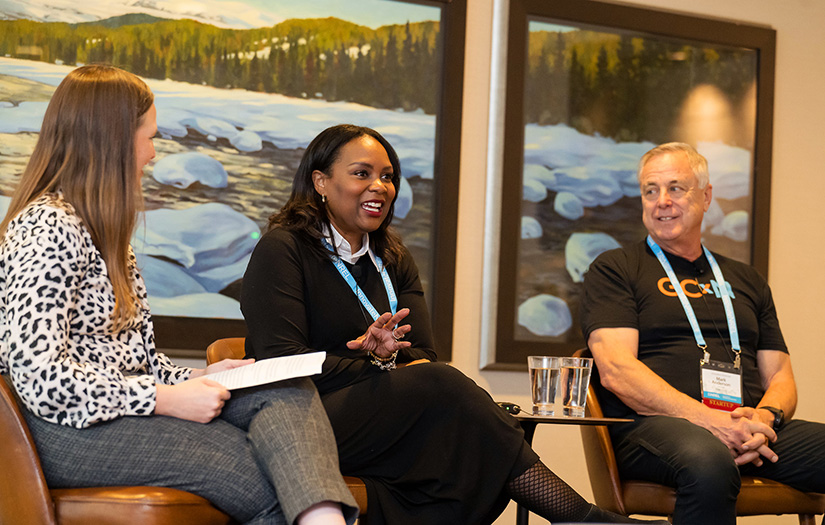NREL's Innovation and Entrepreneurship Center Catapults Emerging Technologies, Startups, and NREL Research Into Investor and Industry Networks
Catalyzing Relationships To Accelerate the Energy Transition

Gathering in Avon, Colorado, the National Renewable Energy Laboratory’s (NREL’s) Innovation and Entrepreneurship Center (IEC) held the NREL Innovation Showcase on Oct. 15, 2024, to bring together cleantech and climate-tech entrepreneurs, industry experts, investors, and NREL researchers around the theme “Demand Matters.”
As a leading force in bridging emerging technologies with market opportunities, the IEC plays a critical role in connecting innovators with investors and industry stakeholders to drive climate solutions forward.
Discussions at the Innovation Showcase highlighted how industry demand drives investability, as signals from large corporate partners help guide startups and investors toward the most promising technologies.
“NREL’s IEC is a powerful convener of the voices and stakeholders necessary to advance climate technologies,” said Katie Richardson, IEC group manager. “At the Innovation Showcase, we help grow and connect a collaborative ecosystem to accelerate the energy transition.”
One of the event’s panelists, Akilah LeBlanc, general manager of Commercial Innovation Partnerships at Shell, emphasized the collaborative atmosphere and policy-driven discussions shaping clean energy innovation. Through partnerships like the Shell GameChanger Accelerator Powered by NREL, the IEC provides promising cleantech startups with access to financial resources, state-of-the-art facilities, and world-class technical experts—crucial resources for scaling impactful climate solutions.
“It is always inspiring for me to be in a room of diverse thinkers with common goals. We challenge each other while finding common ground,” LeBlanc said. “I heard many references to the importance of policy, legislation, regulation, and incentives to drive the energy transition. Approaches will vary across countries and regions, but with shared goals, we can leverage these diverse approaches and make a measurable impact to deliver cleaner energy solutions.”
Scaling Is Dependent on Meeting Critical Milestones for Economic Viability
Another participant, Pulakesh Mukherjee, cofounder and managing partner at Imperative Ventures, has attended NREL IEC events for 15 years and sees big opportunities for companies participating in the energy transition. Mukherjee advocates that startups need financial resources and support from the investment community as well as technical experts at organizations like NREL to identify and achieve those milestones necessary to scale production.
“Not every technology will achieve the metrics necessary to support scale-up,” Mukherjee said. “These are very large and competitive markets with well-entrenched incumbents. Startup success requires demonstrating economically viable process economics at pilot and demonstration scale before a first-of-a-kind commercial facility should even be considered.”

Valuable Inputs for Startups From a Demand Perspective
The core question in the demand equation is whether consumers will pay a green premium for a lower-emissions product, as pricing and demand are closely linked.
At the Innovation Showcase, speakers and entrepreneurs Mike Konev and Kevin Sullivan discussed how to link innovation and demand, emphasizing the effects of regulations and green premiums on consumer demand.
Their startup, Tereform, transforms waste clothing and textiles into new materials for fabrics, diverting waste from landfills and reducing the carbon footprint for clothing manufacturers.
Identifying the vertical industry with the highest demand and largest pain points was crucial to finding the best application for their technology.
“Our technology can work with a lot of different materials, so pinpointing interested companies, the right customers, and the most suitable product was critical to our process,” Konev said.
Konev and Sullivan began as NREL researchers, developing and licensing their intellectual property before launching Tereform after graduating from the U.S. Department of Energy’s (DOE's) Energy I-Corps program in 2021. Konev also participated in another IEC-managed DOE program, West Gate, which provided access to NREL’s lab space and research capabilities as well as business training and mentorship.
Their entrepreneurial journey illustrates how the IEC ecosystem, along with resources from investors and industry sponsors such as Wells Fargo, Shell, and Chevron, helps commercialize lab technologies.
“We were able to confirm that there is some appetite for a green premium price on recycled textiles,” Sullivan said. “But ultimately, if you want to have the bigger players adopt it, you must be cost competitive. You need to have a pathway to cost parity without a green premium.”
The Importance of Financial Viability and a System-Level Analysis
The need for cost-competitive alternatives underscores the requirement for a comprehensive approach to scaling companies in the energy transition. According to Mukherjee, NREL has the technical expertise to complement a system-level approach to investing in the space.
“Energy is a commodity product, and we need to pay attention to the entire ecosystem,” Mukherjee said. “The energy transition will not happen in silos; it requires collaboration across policy, finance, and technical innovation and development. Every sector needed for the energy transition to advance—including hydrogen, geothermal, industrial decarbonization, and energy storage—is an area in which NREL has expertise in.”
Building on this perspective, LeBlanc emphasized NREL’s integral role in fostering collaboration within the clean energy landscape.
“The importance of NREL both as a creator and convener of the Innovation Showcase is vital to the clean-energy technology innovation system,” LeBlanc said.
As NREL’s hub for supporting startups and managing cleantech accelerators with funding partners, the IEC also hosted the Industry Growth Forum and Camp Cleantech this year. Many attendees return annually to strengthen relationships and explore partnerships that uncover demand and investment opportunities.
Visit the NREL Innovation and Entrepreneurship Center website for more information on programs for cleantech and climate-tech startups, scaleups, and entrepreneurs.
Last Updated Jan. 22, 2026
